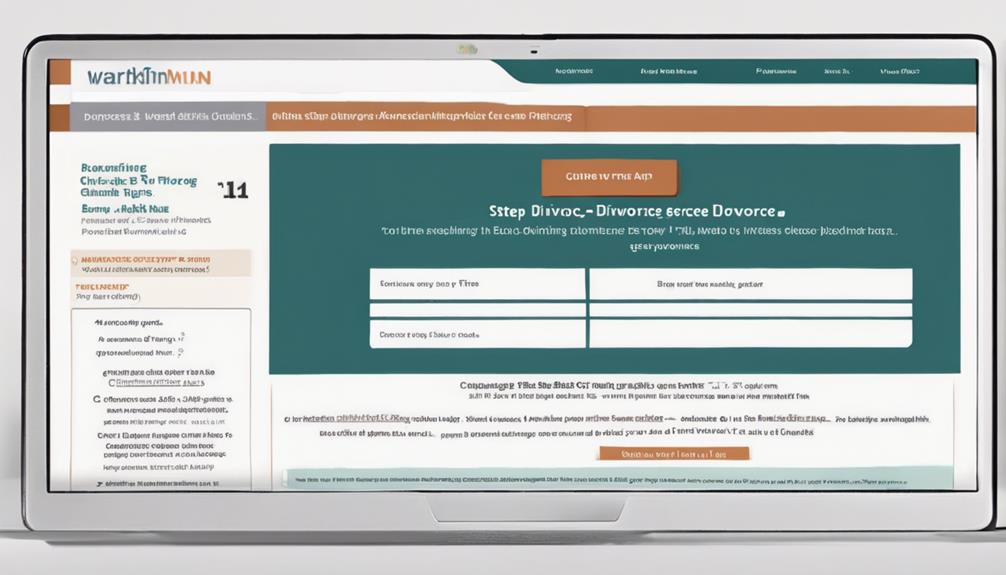Texas divorce mediation offers a variety of advantages. For starters, it is cost-effective, helping couples save a significant amount of money compared to going through court proceedings. Additionally, mediation helps reduce stress and conflict by promoting open communication and collaborative problem-solving. Personalized solutions tailored to individual needs empower couples to shape their own futures. Furthermore, the quicker decision-making process in mediation accelerates issue resolution. Ultimately, direct involvement in the outcome encourages empowerment and mutual understanding. By exploring Texas divorce mediation, couples can simplify the separation process and achieve more harmonious outcomes.
Key Takeaways
- Cost-effective alternative to court proceedings.
- Promotes reduced stress and conflict.
- Offers personalized solutions for unique needs.
- Accelerates decision-making process.
- Enhances communication and mutual understanding.
Cost-Effective Resolution
When considering divorce options in Texas, choosing mediation over litigation can result in substantial cost savings. Mediation in Texas is a cost-effective alternative to traditional court proceedings, with average costs ranging from $6,000 to $7,000, much less than litigated divorces.
Private mediators in Texas offer affordable options, saving couples around $18,000 to $19,000 compared to going through the court system. The cost-effectiveness of mediation is attributed to reduced attorney involvement and streamlined processes, making it a financially efficient way to resolve divorce issues.
Reduced Stress and Conflict

Choosing Texas divorce mediation can greatly reduce stress and conflict by promoting a collaborative and communicative atmosphere for couples looking for a peaceful separation. Through the process of divorce mediation, open communication is encouraged, allowing both parties to express their concerns and preferences openly. This emphasis on negotiation and dialogue helps minimize misunderstandings and disagreements, leading to a more harmonious resolution. By working together to find mutually agreeable solutions, couples can navigate the complexities of divorce in a less confrontational manner.
Studies have shown that couples who opt for divorce mediation experience lower levels of stress and animosity compared to those who choose traditional litigation. The focus on addressing issues calmly and constructively in mediation can greatly lower emotional tensions and contribute to improved overall well-being for both parties involved. By fostering a cooperative environment and encouraging respectful communication, divorce mediation offers a more amicable path to resolving conflicts and reaching agreements that benefit everyone involved.
Personalized Solutions
When it comes to Texas divorce mediation, tailored agreements benefit both parties by addressing their unique needs and concerns.
The individualized approach of mediation promotes mutual understanding and cooperation, fostering a more collaborative atmosphere.
Customized solutions allow for creative and flexible outcomes that may not be achievable through traditional litigation.
Tailored Agreements Benefit
Crafting tailored agreements in Texas divorce mediation involves working with a neutral mediator to address the specific needs and concerns of all parties involved. These personalized solutions are designed to cater to the unique circumstances of each individual, ensuring a fair and satisfactory outcome for everyone. By customizing agreements through mediation, parties have the freedom to shape solutions that align with their goals and requirements. This level of flexibility allows for creative problem-solving approaches that can cover a wide range of issues, including child custody, support, and property division. Ultimately, tailored agreements in divorce mediation empower individuals to take control of their futures and make decisions that suit their best interests.
| Benefits of Tailored Agreements in Texas Divorce Mediation | ||
|---|---|---|
| Promotes Fairness and Satisfaction | Empowers Individuals to Shape Their Future | Encourages Creative Problem-Solving Approaches |
Individualized Approach Promotes
Through an individualized approach, Texas divorce mediation explores the development of personalized solutions that cater specifically to the unique needs of each couple. In this process, mediators investigate the specific circumstances and preferences of each party, ensuring that agreements are tailored to address individual concerns effectively. By customizing solutions, mediation takes into account the dynamics of the relationship, leading to agreements that work for both spouses. This personalized approach not only results in more satisfactory outcomes but also helps couples achieve resolutions that are mutually beneficial and sustainable.
- Mediators focus on understanding unique circumstances and preferences.
- Personalized solutions address specific concerns and goals.
- Tailored agreements consider individual relationship dynamics.
- Customized solutions lead to mutually beneficial outcomes.
Customized Solutions Foster
Customized solutions in Texas divorce mediation are tailored to meet the individual needs and concerns of each party involved. Through personalized agreements, tailored solutions are crafted to address specific issues, fostering a collaborative and constructive approach to resolving divorce matters. In mediation, flexibility allows for the creation of customized agreements that cover areas such as property division, child custody, and financial support. This tailored approach promotes a more amicable resolution, empowering individuals to reach agreements that align with their unique circumstances. By focusing on customized solutions in divorce mediation, parties can work together to find mutually beneficial outcomes, fostering a sense of empowerment and control over the divorce process.
| Customized Solutions in Texas Divorce Mediation |
|---|
| Tailored to Individual Needs and Concerns |
| Personalized Agreements for Specific Issues |
| Flexibility to Create Customized Agreements |
| Covering Areas like Property Division |
| Promoting Collaborative and Constructive Approach |
Quicker Decision-Making Process

In Texas divorce mediation, the quicker decision-making process speeds up negotiations, facilitating compromise agreements and enhancing communication between parties.
This efficiency allows for timely resolutions, saving time, money, and emotional stress associated with prolonged court battles.
Mediation's focus on swift solutions benefits divorcing couples seeking a more efficient way to settle their differences.
Speeds up Negotiations
By utilizing Texas divorce mediation, negotiations can be expedited considerably, resolving issues in a matter of weeks rather than years. Efficient discussions during mediation allow parties to reach an agreement swiftly, avoiding prolonged legal battles. Here are some key points highlighting how mediation speeds up negotiations:
- Focused Discussions: Mediation enables focused and productive discussions, cutting through the clutter efficiently.
- Prompt Conflict Resolution: Parties can swiftly address conflicts and come to mutually beneficial resolutions.
- Time-Saving Process: Compared to traditional litigation, mediation saves significant time by streamlining the decision-making process.
- Reduced Stress: Speeding up negotiations through mediation reduces stress and uncertainty, providing a quicker path to closure for all involved.
Facilitates Compromise Agreements
Facilitating compromise agreements through Texas divorce mediation accelerates the decision-making process substantially. By engaging in mediation, couples can actively participate in creating solutions that meet both parties' needs, expediting the resolution of their divorce.
This collaborative approach fosters open communication, making it easier to reach agreements efficiently. Mediation focuses on identifying mutual interests and prioritizing needs, streamlining the compromise process. In Texas, mediation empowers individuals to find common ground and make prompt decisions that lead to mutually beneficial outcomes.
This method not only speeds up the divorce process but also guarantees that both parties have a say in the final agreements, promoting a more amicable and satisfying resolution.
Enhances Communication Between Parties
Improving communication between parties in Texas divorce mediation greatly speeds up the decision-making process. Effective communication allows each party to express their needs and concerns clearly, leading to more productive discussions and efficient resolution of issues.
Here are four ways in which enhanced communication benefits the decision-making process in mediation:
- Encourages active listening and understanding.
- Helps parties express their needs and concerns effectively.
- Reduces misunderstandings and conflicts.
- Facilitates timely and efficient progress towards reaching agreements.
Direct Involvement in the Outcome

Through Texas divorce mediation, we actively shape the outcome of our settlement by directly participating in decision-making and negotiation processes. This hands-on approach gives us control over the final agreement, allowing us to voice our concerns, needs, and preferences throughout the mediation sessions. Unlike in litigation where a judge makes the decisions, mediation empowers us to find personalized and mutually agreeable solutions. Our direct involvement guarantees that the settlement agreement reflects our collaborative efforts and input, leading to a resolution that is tailored to our unique circumstances and priorities.
| Benefits of Direct Involvement in Texas Divorce Mediation |
|---|
| Empowers parties to make decisions |
| Allows for personalized solutions |
| Reflects collaborative efforts |
Amicable and Cooperative Approach

Texas divorce mediation is focused on creating a cooperative environment for conflict resolution. It emphasizes open communication and constructive dialogue to find mutually beneficial solutions. By fostering peaceful resolution and enhancing communication skills, mediation aims to decrease hostility and build a more positive post-divorce relationship.
Peaceful Conflict Resolution
Encouraging open communication and collaboration, divorce mediation in Texas fosters a peaceful and cooperative approach to resolving conflicts.
- Mediation prioritizes finding common ground
- It aims to foster understanding between parties
- The process promotes positive interactions
- Mediation helps create fair and sustainable agreements
Improved Communication Skills
In divorce mediation in Texas, fostering improved communication skills through an amicable and cooperative approach is key to facilitating understanding and dialogue between spouses. By encouraging constructive conversations and problem-solving, mediation helps parties express their needs and concerns effectively. This cooperative approach allows for a more open and honest exchange of ideas, leading to sustainable agreements that benefit both parties. Through mediation, individuals learn to communicate in a way that promotes understanding and collaboration, setting a positive tone for future interactions. The table below illustrates how improved communication skills can transform the divorce mediation process:
| Benefits of Improved Communication Skills |
|---|
| Enhanced Understanding between Spouses |
| Increased Problem-Solving Abilities |
| Sustainable Agreements |
Empowerment of Parties

Empowering parties in divorce mediation involves actively engaging them in creating personalized solutions that cater to their unique needs. When parties feel empowered throughout the mediation process, they're more likely to be satisfied with the final outcome.
Here are some key ways in which empowerment plays an important role in Texas divorce mediation:
- Ownership: Parties take ownership of the decisions made during mediation, leading to a more sustainable agreement.
- Control: By actively participating in the negotiation process, parties feel a sense of control over the outcome.
- Collaboration: The collaborative nature of mediation fosters a sense of empowerment, as parties work together to find mutually beneficial solutions.
- Customization: Mediation allows parties to tailor solutions to their specific circumstances, ensuring that the agreement meets their individual needs and concerns.
Through empowerment, parties can navigate the complexities of divorce with confidence and agency, ultimately reaching agreements that reflect their unique situations and priorities.
More Sustainable Agreements

Through fostering mutual understanding and compromise, sustainable agreements in Texas divorce mediation are built on a foundation of long-term considerations. By prioritizing communication and cooperation, mediated agreements are more likely to endure over time, addressing the unique needs of both parties. This approach promotes fairness and lasting resolutions, ensuring the well-being of everyone involved, especially children.
In mediation, the focus on family law attorney assistance and dispute resolution techniques helps create agreements that aren't only legally sound but also emotionally sustainable. Parties have the opportunity to tailor solutions to their specific circumstances, leading to outcomes that are more likely to be upheld and respected.
Avoidance of Court Proceedings

By choosing Texas divorce mediation, couples can sidestep the need for lengthy and costly court proceedings, opting instead for a confidential and flexible resolution process. Mediation offers a more peaceful and cooperative approach to resolving disputes, allowing both parties to communicate openly and work together towards a mutually agreeable solution. This alternative method not only saves time and money but also reduces the stress and animosity often associated with traditional court battles.
- Confidential Setting: Mediation provides a private environment for discussions, keeping personal matters out of the public record.
- Informal Process: Unlike court proceedings, mediation allows for a more relaxed and informal setting, promoting open communication and collaboration.
- Control Over Outcome: Couples maintain more control over the outcome of their divorce, as they actively participate in crafting the final agreement.
- Customized Solutions: Mediation allows for more flexible and customized solutions tailored to the specific needs and preferences of the parties involved.
Efficient and Mutually Beneficial

In Texas divorce mediation, efficiency and mutual benefit are key factors that distinguish the process from traditional litigation.
Mediation offers a swift resolution, often taking just weeks compared to the years that court battles can drag on. This efficiency not only saves time but also reduces the emotional strain on both parties involved.
Additionally, mediation in Texas is mutually beneficial as it allows each party to actively participate in crafting the outcome of their divorce, fostering a sense of empowerment and control over their future. This collaborative approach promotes understanding and compromise, leading to more satisfactory agreements.
Furthermore, the cost-effectiveness of mediation, with average costs lower than litigated divorces, further emphasizes its benefits.
Frequently Asked Questions
What Happens After Mediation in Texas Divorce?
After mediation in a Texas divorce, a mediated settlement agreement (MSA) is drafted. The MSA details the agreed-upon terms, filed with the court, and becomes legally binding. The court includes it in the final divorce decree, moving the process forward.
What Are the Disadvantages of Divorce Mediation?
Uncovering hidden assets, lack of conflict, and unwillingness to compromise can hinder divorce mediation. Mediators cannot give legal advice. Cases with dishonesty, abuse, or hidden assets may not be suitable for mediation, potentially prolonging the process and increasing costs.
How Much Does a Mediated Divorce Cost in Texas?
Pricing for a mediated divorce in Texas varies based on case complexity and session frequency. Costs usually range from $6,000-7,000, with private mediators offering flexible payment plans. Reduced attorney involvement contributes to the affordability.
Can a Mediated Divorce Settlement Be Overturned in Texas?
Yes, a mediated divorce settlement can be overturned in Texas under specific circumstances. One party must file a motion with the court citing reasons for the request. It's a legal process involving evidence presentation and hearings.
How Can Texas Divorce Mediation Help in Resolving Legal Issues?
Texas divorce mediation can be a beneficial tucson divorce lawyer choice for resolving legal issues. It offers a collaborative, non-confrontational environment to reach amicable agreements on important matters like child custody, property division, and spousal support. Mediation can help couples avoid costly and time-consuming courtroom battles.
Conclusion
To wrap up, Texas divorce mediation offers a cost-effective, personalized, and efficient way to resolve conflicts. With reduced stress and direct involvement in the outcome, parties can make quicker decisions and reach sustainable agreements.
Avoiding court proceedings and empowering individuals, mediation provides a mutually beneficial solution. Overall, the benefits of Texas divorce mediation are as vast as the Lone Star State itself, offering a streamlined process for those seeking a peaceful resolution.










